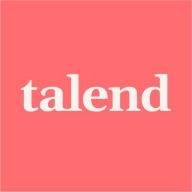

Talend Open Studio and AWS Glue compete in the ETL tools category. AWS Glue seems to have the upper hand in cloud-based scalability and integration with AWS services, while Talend Open Studio stands out for its diverse data source connectivity and customization capabilities.
Features: AWS Glue offers cloud-based scalability, seamless AWS service integration, and a user-friendly interface for building ETL jobs with minimal coding. Talend Open Studio provides a wide array of pre-built connectors, robust customization options, and flexibility to handle multiple data sources efficiently.
Room for Improvement: Talend Open Studio could enhance its performance, error handling, and modern tool integration capabilities. AWS Glue faces challenges with transformation setup complexity, high costs, and limited multi-cloud support, which could improve by reducing complexity and enhancing cloud agnosticism.
Ease of Deployment and Customer Service: Talend Open Studio's open-source model promotes easy deployment across diverse infrastructures, while AWS Glue shines in quick cloud-native deployment. Talend relies on community forums for support, where AWS Glue offers tiered support systems, though both could improve in responsiveness and documentation clarity.
Pricing and ROI: Talend Open Studio is cost-effective for small teams due to its open-source nature, while AWS Glue's pay-as-you-go model can lead to high costs for significant usage but suits variable budgets. Talend provides ROI by saving on license costs, whereas AWS Glue enhances cloud-based data processing, offering value for enterprises.
I advocate using Glue in such cases.
AWS's documentation is reliable, and careful reference often resolves missed upgrade details.
For complex Glue-related problems such as job failures or permission issues, their documentation is good, but having direct access to support helps cut down troubleshooting time significantly.
It is beneficial to upgrade jobs, and we conduct extensive testing in development before migrating to production.
It can easily handle data from one terabyte to 100 terabytes or more, scaling nicely with larger datasets.
As a managed service, it reduces management burdens.
A more user-friendly and simpler process would help speed up the deployment process.
Learning the latest functionalities is crucial, and while challenging, it is a vital part of staying current and ensuring an efficient ETL process.
With AWS, I gather data from multiple sources, clean it up, normalize it, de-duplicate it, and make it presentable.
If we could have round-the-clock support, we would be able to resolve many issues which we encounter during the development part.
AWS charges based on runtime, which can be quite pricey.
Costing depends on resource usage, and cost optimization may involve redesigning jobs for flexibility.
The smallest cost for a project is around €700, while the largest can reach up to €7,000 based on the scale of the usage.
AWS Glue has reduced efforts by 60%, which is the main benefit.
AWS Glue also enhances job scheduling and orchestration capabilities, integrating with AWS Glue Studio for comprehensive data workflow management.
For ETL, I feel the performance is excellent. If I create jobs in a standard way, the performance is great, and maintenance is also seamless.
It also comes with a console which helps us to monitor the jobs we have built in, making that monitoring part easy.
| Product | Market Share (%) |
|---|---|
| AWS Glue | 13.3% |
| Talend Open Studio | 2.9% |
| Other | 83.8% |


| Company Size | Count |
|---|---|
| Small Business | 11 |
| Midsize Enterprise | 6 |
| Large Enterprise | 32 |
| Company Size | Count |
|---|---|
| Small Business | 22 |
| Midsize Enterprise | 13 |
| Large Enterprise | 18 |
AWS Glue is a serverless cloud data integration tool that facilitates the discovery, preparation, movement, and integration of data from multiple sources for machine learning (ML), analytics, and application development. The solution includes additional productivity and data ops tooling for running jobs, implementing business workflows, and authoring.
AWS Glue allows users to connect to more than 70 diverse data sources and manage data in a centralized data catalog. The solution facilitates visual creation, running, and monitoring of extract, transform, and load (ETL) pipelines to load data into users' data lakes. This Amazon product seamlessly integrates with other native applications of the brand and allows users to search and query cataloged data using Amazon EMR, Amazon Athena, and Amazon Redshift Spectrum.
The solution also utilizes application programming interface (API) operations to transform users' data, create runtime logs, store job logic, and create notifications for monitoring job runs. The console of AWS Glue connects all of these services into a managed application, facilitating the monitoring and operational processes. The solution also performs provisioning and management of the resources required to run users' workloads in order to minimize manual work time for organizations.
AWS Glue Features
AWS Glue groups its features into four categories - discover, prepare, integrate, and transform. Within those groups are the following features:
AWS Glue Benefits
AWS Glue offers a wide range of benefits for its users. These benefits include:
Reviews from Real Users
Mustapha A., a cloud data engineer at Jems Groupe, likes AWS Glue because it is a product that is great for serverless data transformations.
Liana I., CEO at Quark Technologies SRL, describes AWS Glue as a highly scalable, reliable, and beneficial pay-as-you-go pricing model.
Talend Open Studio is a free, open source ETL tool for data integration and Big Data. The solution enables you to extract diverse datasets and normalize and transform them into a consistent format which can be loaded into a number of third-party databases and applications.
Talend Open Studio Features
Talend Open Studio has many valuable key features. Some of the most useful ones include:
Talend Open Studio Benefits
There are several benefits to implementing Talend Open Studio. Some of the biggest advantages the solution offers include:
Reviews from Real Users
Below are some reviews and helpful feedback written by PeerSpot users currently using the Talend Open Studio solution.
Elio B., Data Integration Specialist/CTO at Asset messages, says, "The solution has a good balance between automated items and the ability for a developer to integrate and extend what he needs. Other competing tools do not offer the same grade of flexibility when you need to go beyond what is provided by the tool. Talend, on the other hand, allows you to expand very easily."
A Practice Head, Analytics at a tech services company mentions, “The data integration aspect of the solution is excellent. The product's data preparation features are very good. There's very useful data stewardship within the product. From a technical standpoint, the solution itself is pretty good. There are very good pre-built connectors in Talend, which is good for many clients or businesses, as, in most cases, companies are dealing with multiple data sources from multiple technologies. That is where a tool like Talend is extremely helpful.”
Prerna T., Senior System Executive at a tech services company, comments, “The best thing I have found with Talend Open Studio is their major support for the lookups. With Salesforce, when we want to relate our child objects to their parent object, we need to create them via IDs. Then the upsert operation, which will allow you to relate a child object to the event, will have an external ID. That is the best thing which keeps it very sorted. I like that.”
An Implementation Specialist, Individual Contributor at a computer software company, states, “I can connect with different databases such as Oracle Database or SQL Server. It allows you to extract the data from one database to another. I can structure the data by filtering and mapping the fields.” He also adds, “It is very user-friendly. You need to know the basics of SQL development or SQL queries, and you can use this tool.”
PeerSpot user Badrakh V., Information System Architect at Astvision, explains, "The most valuable features are the ETL tools."
We monitor all Cloud Data Integration reviews to prevent fraudulent reviews and keep review quality high. We do not post reviews by company employees or direct competitors. We validate each review for authenticity via cross-reference with LinkedIn, and personal follow-up with the reviewer when necessary.